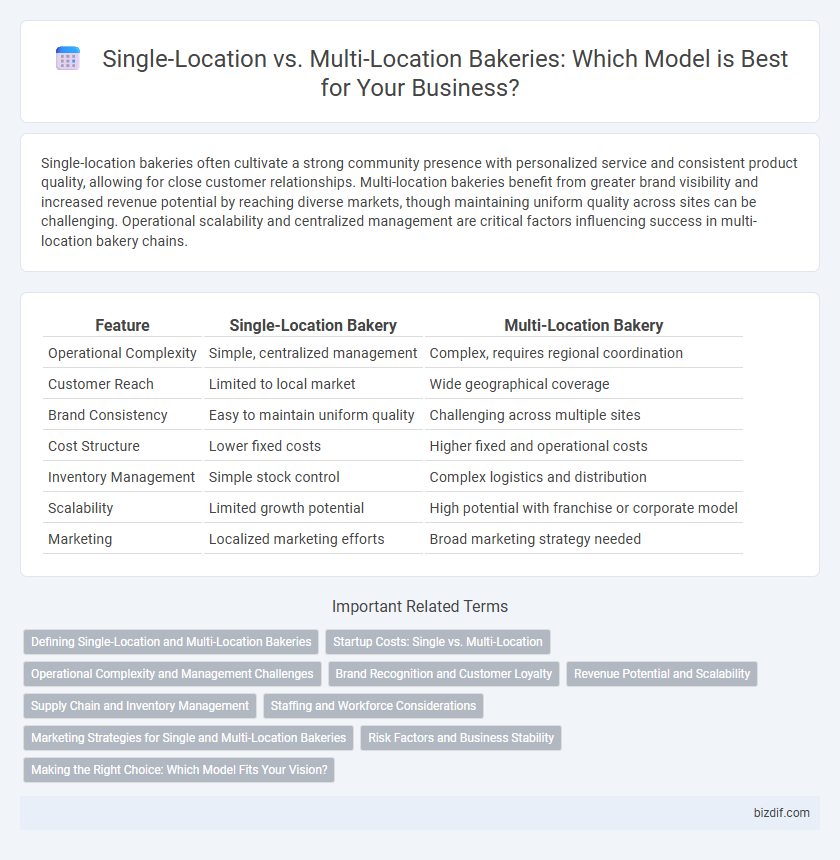Single-location bakeries often cultivate a strong community presence with personalized service and consistent product quality, allowing for close customer relationships. Multi-location bakeries benefit from greater brand visibility and increased revenue potential by reaching diverse markets, though maintaining uniform quality across sites can be challenging. Operational scalability and centralized management are critical factors influencing success in multi-location bakery chains.
Table of Comparison
| Feature | Single-Location Bakery | Multi-Location Bakery |
|---|---|---|
| Operational Complexity | Simple, centralized management | Complex, requires regional coordination |
| Customer Reach | Limited to local market | Wide geographical coverage |
| Brand Consistency | Easy to maintain uniform quality | Challenging across multiple sites |
| Cost Structure | Lower fixed costs | Higher fixed and operational costs |
| Inventory Management | Simple stock control | Complex logistics and distribution |
| Scalability | Limited growth potential | High potential with franchise or corporate model |
| Marketing | Localized marketing efforts | Broad marketing strategy needed |
Defining Single-Location and Multi-Location Bakeries
Single-location bakeries operate from a single storefront, offering personalized customer experiences and maintaining consistent product quality with direct management control. Multi-location bakeries expand their presence across multiple stores or regions, leveraging brand recognition and economies of scale to increase market reach and production capacity. Operational complexity rises with multiple sites, requiring centralized inventory management and standardized recipes to ensure uniformity in baked goods across all locations.
Startup Costs: Single vs. Multi-Location
Startup costs for a single-location bakery typically include expenses for leasing space, equipment purchase, initial inventory, and local permits, averaging between $50,000 to $150,000 depending on size and market. Multi-location bakeries face exponentially higher startup costs due to multiple leases, increased equipment needs, staffing costs, and marketing efforts, often exceeding $500,000 across all sites. Economies of scale can reduce per-unit costs but require significant upfront capital investment and complex operational management.
Operational Complexity and Management Challenges
Managing a single-location bakery allows for streamlined operations with direct oversight on inventory, staffing, and customer service, reducing complexity. Multi-location bakeries face increased operational challenges such as coordinating supply chains, maintaining consistent product quality, and managing diverse teams across sites. Effective communication systems and centralized management tools are critical to overcoming these complexities and ensuring cohesive brand standards.
Brand Recognition and Customer Loyalty
Single-location bakeries often cultivate strong brand recognition and customer loyalty through personalized service and community engagement, creating a unique local identity. Multi-location bakeries leverage consistent branding and product quality across various areas, expanding their customer base while maintaining loyal clientele through recognizable standards. Strategic marketing and localized offerings enhance brand presence and foster repeat customers in both single and multi-location bakery models.
Revenue Potential and Scalability
Single-location bakeries often generate stable revenue with lower overhead costs, providing focused quality control but limited market reach. Multi-location bakeries significantly increase revenue potential by expanding customer base and leveraging economies of scale, though they require complex management and higher initial investment. Scalability is more achievable with multi-location models due to standardized processes and brand recognition across different markets.
Supply Chain and Inventory Management
Managing supply chain and inventory in a single-location bakery simplifies ordering processes and reduces variability in ingredient quality due to centralized control. Multi-location bakeries face complex challenges, requiring sophisticated inventory management systems to synchronize stock levels and coordinate deliveries across multiple sites, minimizing waste and ensuring product consistency. Leveraging advanced analytics and real-time data sharing optimizes supply chain efficiency and reduces costs in both single and multi-location bakery operations.
Staffing and Workforce Considerations
Single-location bakeries benefit from a tightly knit workforce allowing for flexible staffing and consistent quality control, optimizing labor costs within a smaller scale. Multi-location bakeries require more complex staffing strategies, including regional managers, standardized training programs, and robust scheduling systems to maintain uniform service and product standards. Workforce considerations in multi-location settings also involve coordinated recruitment processes and potential labor law compliance variations across different jurisdictions.
Marketing Strategies for Single and Multi-Location Bakeries
Single-location bakeries benefit from hyper-local marketing strategies such as community events, local SEO, and personalized customer engagement to build a loyal neighborhood following. Multi-location bakeries require scalable marketing approaches including regional advertising campaigns, consistent brand messaging across sites, and centralized social media management to maintain uniform customer experience. Leveraging data analytics for targeted promotions and customer segmentation enhances marketing effectiveness for both single and multi-location bakery businesses.
Risk Factors and Business Stability
Operating a single-location bakery limits exposure to diverse market risks but increases vulnerability to local economic downturns and operational disruptions. Multi-location bakeries spread risk across various demographics and geographic areas, enhancing business stability through diversified income streams. Effective management, consistent quality, and strong brand reputation become critical in multi-location operations to mitigate risks associated with scalability and market competition.
Making the Right Choice: Which Model Fits Your Vision?
Selecting between a single-location bakery and a multi-location model hinges on your long-term growth goals and operational capacity. A single-location bakery allows for focused brand development and quality control, while a multi-location approach supports broader customer reach and increased revenue streams but requires robust management systems. Understanding your target market, resource availability, and scalability potential ensures alignment with your bakery's vision and sustainable success.
Single-location vs Multi-location Infographic

 bizdif.com
bizdif.com